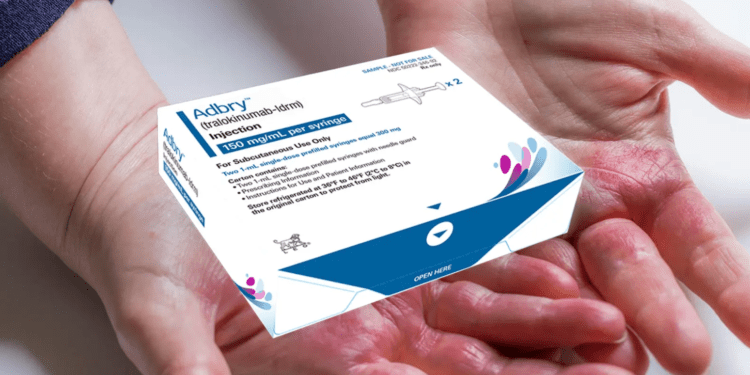Introducing Adbry (Tralokinumab-ldrm), Delving into its effects, Adbry, a medication prescribed for certain conditions, comes with a spectrum of potential outcomes. From commonly observed to serious, and even rare side effects, it’s crucial to understand its impact on different age groups – from the unique considerations of pregnancy, breastfeeding, the pediatric age group, and to the elderly population.
Exploring its categorization based on various body systems, this blog will detail allergic reactions, symptoms of overdose, and potential long-term effects, offering comprehensive insights into the medication’s effects and implications.
Common Side Effects
Adbry (Tralokinumab-ldrm) may present common side effects that individuals using the medication might encounter. These commonly observed effects could include :
- Eye and eyelid inflammation (redness, swelling, and itching)
- Injection site reactions
- High count of a certain white blood cell (eosinophilia)
Serious Side Effects
More common
- Body aches or pain
- Burning, dry, or itching eyes
- Chills
- Cough
- Discharge, excessive tearing
- Ear congestion
- Fever
- Headache
- Loss of voice
- Redness, pain, swelling of the eye, eyelid, or inner lining of eyelid
- Stuffy or runny nose
- Trouble breathing
- Unusual tiredness or weakness
Less common
- Black, tarry stools
- Chest pain
- Painful or difficult urination
- Sore throat
- Sores, ulcers, or white spots on lips or in mouth
- Swollen glands
- Unusual bleeding or bruising
Incidence not known
- Chest tightness
- Difficulty swallowing
- Dizziness
- Fast heartbeat
- Hives, itching, skin rash
- Large, hive-like swelling on face, eyelids, lips, tongue, throat, hands, legs, feet, or sex organs
- Puffiness or swelling of the eyelids or around the eyes, face, lips, or tongue
Allergic Reactions
If you experience any of the following symptoms while using Adbry, which include breathing problems, itching, skin rash, swelling of the face, mouth, or tongue, fainting, dizziness, low blood pressure, hives, eye pain, redness, or blurred vision, stop using it immediately. Contact your healthcare provider or seek emergency assistance. These symptoms could indicate allergic reactions, including a severe response known as anaphylaxis.
Other Side Effects
More common
- Bleeding
- Blistering
- Burning
- Coldness
- Discoloration of the skin
- Feeling of pressure
- Hives
- Infection,
- Inflammation
- Itching
- Lumps
- Numbness
- Pain
- Rash redness
- Scarring
- Soreness
- Stinging
- Swelling
- Tenderness
- Tingling
- Ulceration
- Warmth at the injection site
Categorize the Side Effects of Adbry (Tralokinumab-ldrm) Based on Various Body Systems
Respiratory
Upper respiratory tract infections:
- Viral upper respiratory tract infection
- Pharyngitis
- Nasopharyngitis
- Common cold (10% or more)
Ocular
- Conjunctivitis (included conjunctivitis, allergic conjunctivitis; up to 13.6%) (10% or more)
- Allergic conjunctivitis (1% to 10%)
- Keratitis ( keratoconjunctivitis, atopic keratoconjunctivitis, ulcerative keratitis) (0.1% to 1%)
Immunologic
- Anti-drug antibody (1% to 10%)
- Neutralizing antibodies (0.1% to 1%)
Hematologic
- Eosinophilia (1% to 10%)
Dermatologic
- Eczema herpeticum (0.1% to 1%)
Local
- Injection site reactions ( pain, swelling, erythema/redness; up to 11.1%) (10% or more)
Side Effects During Pregnancy and Breastfeeding
Human immunoglobulin G (IgG) antibodies are capable of passing through the placenta, potentially resulting in the transmission of this drug from the mother to the fetus.
There is limited data regarding the use of this drug in pregnant women, making it challenging to assess associated risks, such as potential harm to the fetus or reproductive effects.
However, there are no controlled studies in human pregnancies.
As per the US FDA, this drug does not have an assigned pregnancy category due to the amendment in the pregnancy labeling rule for prescription drugs.
Because this drug is a large protein molecule, it is anticipated that the quantity present in breast milk would likely be minimal. Furthermore, the infant’s digestive system might partially break down the drug, resulting in minimal absorption by the infant.
As suggested by some experts, a decision should be carefully considered regarding whether to discontinue breastfeeding or stop using this drug, taking into account both the importance of the therapy for the mother and the benefits of breastfeeding for the child.
There is no available information regarding the presence of this drug in human milk, its impact on breastfed infants, or its influence on milk production. Although maternal immunoglobulin G (IgG) is present in breast milk, the effects of localized gastrointestinal exposure and limited systemic exposure to this drug on the breastfed infant remain unknown.
Side Effects of Adbry (Tralokinumab-ldrm) in Pediatric (Children)
Adbry is a biologic medication used to treat moderate-to-severe atopic dermatitis (eczema) in adults. It is not currently FDA-approved for use in children under the age of 18, but clinical trials are underway to assess its safety and efficacy in this population.
Side Effects of Adbry (Tralokinumab-ldrm) in Geriatric Age (Elderly individuals)
There is limited data on the safety and efficacy of Adbry in geriatric patients (those aged 65 years and older). However, a small study of 30 elderly patients with moderate-to-severe eczema found that Adbry was safe and effective in this population. The study participants reported significant improvements in eczema symptoms and skin clearance after treatment with Adbry.
Contact your healthcare provider for guidance regarding any potential side effects. You can also report side effects to the U.S. Food and Drug Administration (FDA) by calling 1-800-FDA-1088.



